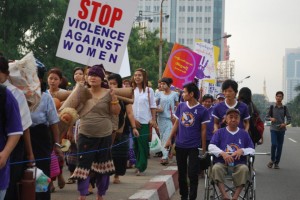Burma’s Reform Process Must Include Ending Violence Against Women
By Burma Partnership • November 26, 2012 Yesterday, as on every 25 November, women and men around the world celebrated the International Day for the Elimination of Violence against Women. Violence against women takes many forms, physical, sexual, psychological and economic and occurs all around the world and in every culture. Burma is no exception to that rule.
Yesterday, as on every 25 November, women and men around the world celebrated the International Day for the Elimination of Violence against Women. Violence against women takes many forms, physical, sexual, psychological and economic and occurs all around the world and in every culture. Burma is no exception to that rule.
Women in Burma, and in particular in ethnic nationality areas, are the victims of sexual violence, sexual exploitation, human trafficking and discrimination. In addition, in situations of armed conflict and extreme poverty, they are often amongst the most vulnerable population and they bear the burden of war and displacement.
Rape has been used as a weapon of war by the Burma Army in ethnic areas for decades. In Kachin State where fighting has been ongoing for more than one year, the Kachin Women’s Association – Thailand (KWAT) has documented that Burma Army troops have committed sexual violence against at least 61 women and children, about half of whom were killed. One terrible case that shows the ongoing use of rape by the Burma Army in conflict areas is that of a woman beaten with rifle butts, stabbed with knives, stripped naked and gang-raped over a period of three days in a church by two Burma Army battalions in May of this year.
Despite ceasefire agreements in some ethnic areas like in Karen State, the presence of the Burma Army remains a constant threat for the security of ethnic communities, especially women. In March, a Karen woman reported being “beaten, drugged and sexually assaulted by two men wearing army fatigues.” Development projects are also another driving factor for sexual violence and exploitation of women in ethnic areas. A recent report by the Ta’ang Students and Youth Organization, “Pipeline Nightmare”, studies the impact of the Shwe Gas and Oil Pipeline Project on the Ta’ang people in Northern Shan State. The report concludes that after the pipeline project started there were many instances of sexual harassment and intimidation against women, not just from the Burma Army but by the Chinese construction workers as well.
Very young women and girls from Burma are also trafficked for sexual and labor exploitation, to work in the sex industry or to become brides in Thailand, China, Malaysia, Bangladesh and South Korea.
There has been complete impunity for these crimes as sadly illustrated by the case of Sumlut Roi Ja, who was allegedly abducted and gang-raped by Burma Army soldiers in Kachin State in October 2011. Her husband submitted a formal complaint to the Supreme Court asking for an investigation. The case was dismissed for lack of evidence while Sumlut Roi Ja’s husband was not even permitted to speak at the trial and the judge based his ruling solely on the testimony of the military defendants. After the ruling Moon Nay Li, KWAT Coordinator, concluded: “The message from the Naypyidaw Supreme Court is clear: the Burmese military can rape and kill ethnic women with impunity.”
Yesterday in Rangoon around 200 people gathered at the City Hall and marched on the International Day for the Elimination of Violence against Women. Burma Partnership strongly supports their action and joins them in calling on the Burma government to take all necessary actions to ensure the reform process includes ending all forms of violence against women and girls in Burma.
Tags: Burma Partnership, International Day for the Elimination of Violence against Women, Sexual Violence, WomenThis post is in: Blog
Related PostsBurma Partnership Celebrates Continuing Regional Solidarity for Burma and Embraces the Work Ahead for Progressive Voice
Burma Army Displays Blatant Disregard for 21st Century Panglong Peace Process
Ann Din Coal Power Plant: Local Movement and Action to Preserve and Protect Natural Resources and Land: Mon IDP Report Case Study #4
Latest Human Rights Abuse Case Demonstrates Urgent Need to Reform the Myanmar National Human Rights Commission
Human Rights Far From Guaranteed as US Sanctions on Burma Are Removed









 All posts
All posts